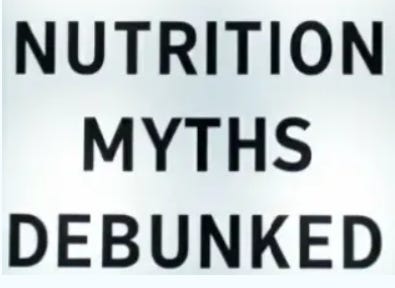10 Nutrition Myths Debunked
The nutrition sphere is full of misconceptions, confusion, and poor dietary choices. To remain healthy, you have to base your decisions on credible sources, and when in doubt, consult with a nutrition expert for guidance tailored to your individual needs. In the meantime, here’s a closer look at ten common nutrition myths and the truth behind them.
MYTH 1: Avoid Red Meat
DEBUNKED: Processed and unprocessed meats get lumped together as being the same, but not all red meat is created equal. Red processed meats, like deli and cured meats (salami, hot dogs), should be avoided due to their potential carcinogen activity. But when it comes to the effects of unprocessed meat, there are no conclusive studies on the risk of disease in our bodies. Base your choices on organic and grass-fed.
Myth 2: All Calories Are Equal
DEBUNKED: While a calorie is a unit of energy, the source of calories matters significantly. Nutrient-dense foods provide more than just calories; they offer vitamins, minerals, and other beneficial compounds. A balanced diet focuses on the quality of calories, not just the quantity.
Myth 3: You Need 8 Glasses of Daily Water
DEBUNKED: Hydration needs vary based on individual factors like age, climate, and activity level. The "8 glasses" rule is a general guideline, but listening to your body and drinking when thirsty is more effective. Foods with high water content also contribute to hydration.
Myth 4: Eating Fat Makes You Fat
DEBUNKED: Fats play crucial roles in our body, protecting organs, maintaining cell membranes, supporting growth and development, and aiding vitamin absorption. But not all fats are created equal. Prioritize olive oil, nuts, organic nut butter, full-fat dairy and avocados, among others. Limit consumption of trans and rancid fats, which are prevalent in refined products.
Myth 5: Low or No-Fat Products Are Healthier
DEBUNKED: Alongside the fear of full fats is the misguided notion that low-fat foods are healthy. This is untrue! Many products labelled low-fat or fat-free contain added sugar or sodium to help make up for the loss of flavour when removing or reducing fat. In addition, because of processing, these foods don’t sufficiently satisfy hunger—and you may find yourself snacking soon after.
Myth 6: Avoid Egg Yolks
DEBUNKED: Studies now suggest that egg consumption doesn’t impact heart disease risk. They contain a variety of essential nutrients such as choline (brain development, liver function, and muscle movement), lutein and zeaxanthin (eye health, prevention of age-related macular degeneration), fat-soluble vitamins, healthy fats, and protein. This powerhouse food can easily be considered a nutritional supplement.
Myth 7: Fresh Produce Is Always Better Than Frozen
DEBUNKED: Frozen fruits and vegetables are often picked at peak ripeness and quickly frozen to preserve nutrients. They can be just as nutritious as fresh produce and sometimes even more so, particularly when fresh options are out of season or have been in transit for a long time.
Myth 8: Everyone Thrives On Gluten-Free Diets
DEBUNKED: Unless you have celiac disease or gluten intolerance, a gluten-free diet is unnecessary. Whole-wheat (whole food, not refined) products have great nutritional benefits, including essential B vitamins and fibre. Be mindful when manufacturers remove gluten, as additional sugar, salt or refined starches are often added to make up the difference in flavour and texture. They will also be higher in fat and calories, and lower in fibre.
Myth 8: Whole Grain Breads Are Healthy
DEBUNKED: Whole grain bread has long been touted as a healthier alternative to white bread. But is this claim truly justified? Real whole-grain bread is made from the entire grain kernel, including the bran, germ, and endosperm. This provides it with a rich source of fibre, vitamins, minerals, and antioxidants.
Modern "whole grain" bread often does not truly contain whole grains. Many commercially produced "whole grain" breads are heavily processed, stripping away much of their nutritional value and fibre. Instead, they may contain refined flours, added sugars, and other ingredients that undermine their health benefits, while becoming a "fast-acting carbohydrate in the body. This can lead to blood sugar problems and weight gain.
Myth 9: Nutrition Labels Don’t Lie
DEBUNKED: There’s some truth to the claim, alongside a lot of smoke and mirrors. Manufacturers are legally obligated to provide accurate nutrition information, but they can still be misleading. A product labelled as 100 calories must indeed contain 100 calories, but the deception lies in minuscule serving sizes. If a box, can, or jar contains four servings, consumers may inadvertently consume more calories than intended by eating the entire contents.
The FDA also permits a margin of error of up to 20% between the stated and actual nutrient values on nutrition labels. This means that the labels are not guaranteed to be completely accurate Further, the allowable margin of error can vary depending on the specific nutrient being measured, soil quality, farming practices, seasonal variations, and food preparation methods.
Myth 10: Protein Bars Are Healthy Snacks
DEBUNKED: Most protein bars are unhealthy due to their content of low-quality ingredients, excessive calories, added sugar, unhealthy fats, or artificial ingredients. Even the supposed “healthy” types are suspect.
If you’re eating them to watch your health or weight, why not choose whole-food snacks that are more economical and always healthier?
Your presence here is greatly valued, and that’s why all our articles are free on this site. But if you've found that the content benefits your life, please consider supporting it through a cost-effective paid subscription. This plays a vital role in covering operational costs and supports the continuation of this independent, unbiased research and journalism work. Thank you!!
If shy about commitments, feel free to leave a one-time tip!





